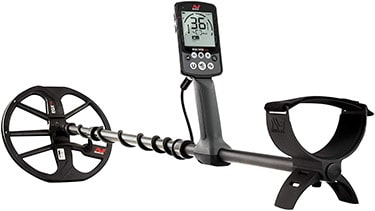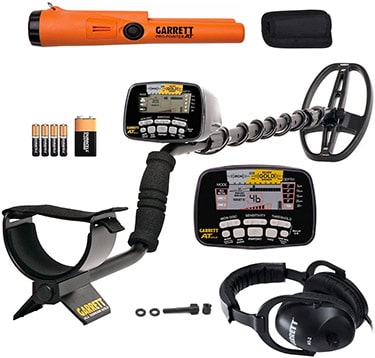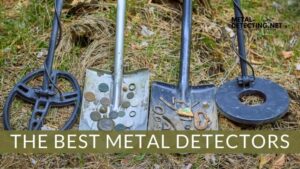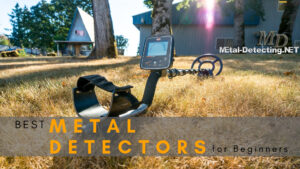Metal detecting is considered an economic activity but some people do it as hobby as well. A good number of Americans have adopted this activity both for a living and as a fun hobby.
Besides financial gains, this activity is also good for those who want to lose weight and get in shape since it involves constant movement from one place to another.
But first things first what is metal detecting?
Metal detecting is the activity of searching for a specific metal in a given location. The device used to carry out this activity is called a metal detector. Besides being used to search for metals for selling purposes, metal detectors are used for several other applications like security, medical examinations etc.
In this article, our focus will be explaining everything you need to know about the best metal detectors for finding gold.
Before going ahead one thing I will have to let you know is that the efficiency and accuracy of any metal detector depends on the conditions under which it is being used. There’s no single metal detector that is considered by the world as the best. It all depends on the conditions under which the detector is used.
Finding the metal detector that suits your needs is not something that you can do in a few minutes more so if you are a beginner in this field. It will require you to do some research to know which one suit your needs.
Best Metal Detector for Gold; Minelab Equinox 800
 If you’re looking for the holy grail of metal detectors for finding gold, the Minelab Equinox 800 is perfect for you.
If you’re looking for the holy grail of metal detectors for finding gold, the Minelab Equinox 800 is perfect for you.
I really like the Equinox 800 because it is extremely versatile and easy to use. I am able to switch settings very easily while out in the field, depending on whether I’m hunting for coins, rings and jewelry, gold nuggets or relics.
It’s also one of a few metal detectors I have owned that includes 2 dedicated gold-finding modes. Weighing only about 3 lbs, it’s easy to carry around all day without feeling tired or having sore shoulders.
In conclusion, the Minelab Equinox 800 Metal Detector is the best metal detector for finding gold. It’s the most accurate of any detector I have used, including other Minelab metal detectors. It is also very durable and waterproof. It provides you with a good number of features that help you avoid false-positives. Making it easier for you to focus on areas where you are more likely to find gold.
Best Detector to find Gold in Rivers; Garrett AT
 The next metal detector I use to find gold is the Garrett AT Gold Metal Detector.
The next metal detector I use to find gold is the Garrett AT Gold Metal Detector.
It is the best detector I have found for finding tiny gold nuggets in rivers or creeks that are less than 5 feet deep. It can be used to find items on land, in shallow waters of up to 10 feet deep and saltwater as well! It is waterproof and submersible.
I have used it to find tiny gold nuggets at least a half inch deep in the mud of small rivers after the water had receded for the summer. If there is a storm, I can use it to detect metal that has washed up on shore after being sunk in deeper waters earlier.
It is very lightweight and comfortable to use, especially for all day prospecting sessions. It’s easy to swing back and forth for hours at a time without getting tired or sore.
It has many different modes, which makes it easy to switch between the settings depending on where you are prospecting and what you are looking for. It also includes a discrimination mode that helps filter out non-precious metals so you can get accurate readings on only the most valuable items.
I have never had to deal with false-positive readings on this detector. This detector can be used in both wet and dry terrain, although it’s best for use in the water.
In conclusion, I like to begin my day out prospecting into rivers or creeks that are up to 5 feet deep using the Garrett AT Gold Metal Detector. It’s the best metal detector for small gold nuggets in shallow water. I also use it on land and to find metal that has washed up onto shore after being submerged by a storm. It is lightweight and very comfortable to use for long periods of time while prospecting. Another great thing about this metal detector is its ability to filter out non-precious metals to give accurate readings. The AT Gold is the king of all metal detectors for small gold nuggets in shallow waters.
Ultimate Buyer’s Guide
There are a number of factors that you will have to consider in order to get the best possible metal detector that is within your budget.
Some of these include; the technology of the metal detector, location of the gold nuggets you are searching for, ground conditions, size of the gold nuggets, your budget, etc.
In this article, we shall explain each of these factors in details and everything you’ll need to know in order to get the best metal detector that will get the job done without parting with a lot of your dollars. Let’s get started!
How much do you intend to invest in this?
As you get into gold metal detecting, its important to know how much money you are willing to spend at the start. This will help you to decide which features of the metal detector you’ll prioritize ahead of others. You’ll most likely not have it all especially at the start.
That’s why you need to know the features of the detector that are most important to you so that you spend your budget wisely.
If you are a beginner in this, I wouldn’t recommend going for anything more than $1000. Do your research wisely so that you get a detector that can get the job done but with a budget less than $1000.
My advice would be analyzing all the factors that we shall discuss in this article. Then write them down in their order of priority based on the environment under which you are going to do the gold detecting.
Make sure the ones with more priority come before the less priority ones. Then get onto amazon or any other online store and start checking out the metal detectors that are between $600 to $1000.
The one that meets most of your priority factors is what you should go with. This will take you some minutes or even hours but it will save you the frustration of just buying without doing analysis.
What type of metal detector do you need?
There basically three types of detectors that you can use to search for gold and they are classified based on the type of technology they use to detect metals.
These include; beat frequency Oscillation, Very Low Frequency (VLF) and Pulse Induction (PI) metal detectors. Here are the use cases for each
Very low frequency detectors (VLF): This type is the most common in the market and its used to detect a wide range of metals. VLF metal detectors detect metals by using two coils that send and receive magnetic pulses to detect metals from under the ground.
They can detect metals up to 2m below the ground. The advantage that the VLF detectors have over the other types is that they offer greater depth capabilities, enhanced Target ID, and better discrimination. I am going to explain what these terms means in a bit. On the negative side of the equation, VLF detectors are not good in grounds that are highly mineralized
Beat frequency oscillation detectors: This type is also common but not to the level of VLF and is mainly used at entry level of metal detecting. It uses two coils beneath it that work hand in hand to generated a signal if a particular type of metal is detected. Just like VLF detectors, beat frequency oscillation detectors also have a limitation of giving inaccurate results especially while detecting metals in a highly mineralized ground.
Pulse induction detectors: This type of detectors gives the most accurate results compared to first two types we have talked about especially in highly mineralized grounds. A PI metal detector works by sending current pulses into the ground.
These pulses create a voltage spike that later stabilizes to zero after a certain period of time. The time taken to stabilize is extremely small if there’s no metal detected. If there’s a metal beneath the ground, the time it takes for the voltage spike to stabilize is more compared to when there’s no metal.
The stabilization time of this voltage spike also depends on the type of metal that has been detected. Pulse detectors will always give the best results when detecting gold nuggets in highly mineralized grounds and in saltwater environments due to their ability to ignore minerals by virtue of their pulse characteristics.
The best choice for beginners is the VLF detector. It is not as accurate the PI in detecting gold especially in mineralized regions but its price is more friendly so you won’t invest a lot at the start. Another advantage is that it can be used to detect smaller nuggets of gold and several other types of metals besides gold.
If you are an experienced gold hunter, then you should go straight to the PI detector. Gold nuggets are normally located in mineralized grounds and this type of detector is what will always give the best results in such conditions.
The operating frequency of the detector
If you chose the VLF detector then you will also have to choose the operating frequency of the detector you need. The common VLF detectors in the market have frequencies ranging between 13Khz to 50KHz. This big difference in frequency means you really need to know the exact frequency of the detector you need before buying.
The frequency you need will largely depend on the size of gold nuggets that you intend to detect. Low frequency detectors are good at finding large sizes of gold nuggets that are a bit deeper. Higher frequency detectors are good for detecting small sized nuggets that are closer to the surface.
This means before determining the frequency of the detector, you will have to know the estimate of the size of nuggets you intend to detect and also the estimate of how deep they are located under the ground.
Level of mineralization
Determining the type of detector, you need and its frequency will also require you to know the level of mineralization of the ground you intend to hunt the gold from.
If the ground is highly mineralized, then the best choice would be a PI gold detector or in the worst case a low frequency VLF detector. But a PI detector is the most reliable in this kind of situation. But if the ground is not highly mineralized then you can opt for the high frequency VLF detectors.
In most cases gold is found in highly mineralized grounds. It’s for this reason why PI detectors will always have a significant edge over the rest of the types when it comes detecting gold.
Discrimination capacity of the detector
The term discrimination in metal detecting refers to the process of distinguishing between metal targets. Metal detectors use electricity and magnetism principles to detect various types of metals that are under the ground. I won’t get so deep into how exactly these principles play out. That is beyond the scope of this article.
But for now, all you need to know is that those are the major principles metal detectors use. Another point you need to note is that different metals have different electricity and magnetism properties.
The difference in these properties is what creates a difference in the kind of signals that are sent to the detector from these metals. For example, the nature of signal from silver will be different from that of iron. So, basing on the nature of signal sent, the detector is able to determine the metal that is available at that specific point.
The capacity of a detector to differentiate between the various signals is what makes it better than the rest while searching for a particular metal in the presence of so many other metals. VLF metal detectors give better results in environments that have several other metals present.
Your level of experience in using metal detectors.
The time you have spent in this field also matters when it comes to the detector you need to choose. A gold metal detector that I would recommend to an experienced gold hunter will not necessarily do a good job for someone new to this field since they may not even know how to take advantage of its strengths.
I would recommend PI detectors to only experienced gold hunters. This is because a PI detector are a little more complex to configure and requires experience for it to do a good job. Beginners should always go for the LVF detectors. They are easier to configure and can also be used to detect several other metals besides gold.
Another reason I recommend VLF detectors for beginner is because of their price. It’s always good to first learn the art of detecting and the various factors that affect your efficiency before investing in a lot of money
Ground balancing
Ground balancing is the process of calibrating the metal detector in order to make it suit the current ground conditions. Ground balancing is specifically important when hunting for gold in highly mineralized grounds. Most advanced metal detectors will always give the option of manually doing the ground balancing or letting the detector do the ground balancing automatically. If you are intending to get gold nuggets in a highly mineralized area, it is recommended to always do the ground balancing manually. This is because automated ground balancing will limit the depth up to which the detector signals will reach hence affecting the accuracy of the signal and in some cases not even getting the signal at all. PI detectors have better ground balancing capacity that VLF detectors. It’s another reason they are used in highly mineralized areas
Energy efficiency of the metal detector
This doesn’t have a direct impact on the results of the detector but it will influence how long you’ll do the detecting before replacing the batteries or recharging. Detectors are powered by batteries that can be either rechargeable or non-rechargeable. The way the metal detector consumes energy determines how long the batteries of the detector will last. The longer the batteries can last the better since it will save you time that you would have to put aside for recharging the battery or buying new battery cells for detectors with non-rechargeable batteries. So, getting a more energy efficient detector will save you this time that you would have otherwise wasted. Regarding energy efficiency, VLF detectors perform better than Pulse Induction detectors. If you expect to use the detector for long hours before recharging then this a factor you may have to put into consideration.
Conclusion
As you plan to buy yourself a new detector for hunting those gold nuggets, you will have to do some homework to avoid messing up and getting something that won’t do what you want it to do. The major factors you need to put into consideration are; your level of experience in using metal detectors, your budget and the type of ground you intend to hunt gold from. With these in mind, you will be able to determine the best features for the kind of metal detector you need.
Another thing you need to note is that there is a lot of information on the internet about gold detecting. The important thing you need to know is everyone shares their view based on their experience while using a specific type of metal detector under particular ground environment conditions. For instance, someone searching for gold in a highly mineralized ground will always consider the PI detectors to be the best because they are designed specifically to handle such ground conditions. But if you use the same PI detector under different ground conditions, you will likely get different results. So, before you buy the metal detector that you saw some other person give a positive review about on the internet, you need to know the conditions under which that particular detector was used. This way you can compare these conditions with the ones in your target area and finally come up with the right features of the detector that will suit your needs.
But if you clearly follow the factors we have shared above; you should be able to make the choice easily. Know your priorities and the budget you have, then make the choice that will meet most of your metal detecting needs. It’s not rocket science.


